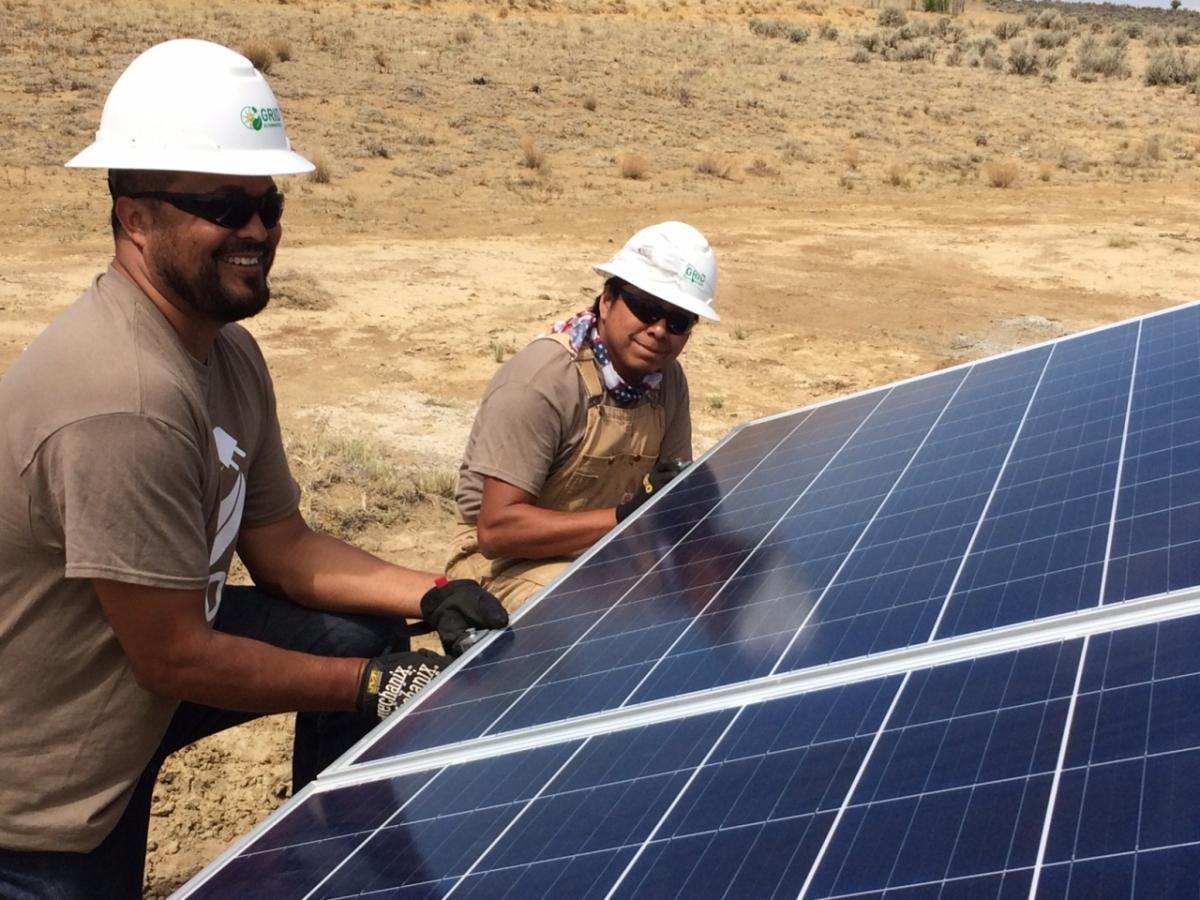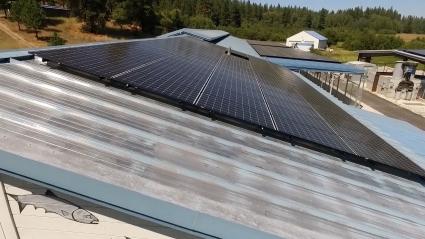Renewable Energy Advances Energy Sovereignty in US Tribal Communities
Twelve tribes selected for grants for new clean energy projects from Tribal Solar Accelerator Fund
Renewable Energy Advances Energy Sovereignty in US Tribal Communities
The Spokane Tribe builds a more climate-resilient community; a mother rebuilds after losing her home in a wildfire; the United Tribes Technical College powers their campus with solar power; and the Big Pine Paiute Tribe's brings reliable, clean energy to their water supply. These are just a few of the projects funded by the Tribal Solar Accelerator fund (TSAF), an initiative of GRID Alternatives, launched with seed funding from Wells Fargo, that aims to catalyze the growth of solar energy and expand solar job opportunities in tribal communities across the United States.
Now in its third year, TSAF has selected its grantees for the 2020-2021 grant cycle, expanding its project map to Alaska, with two Alaska Native grantees included in the grant cycle. The 2020-2021 TSAF grantees are:
- Oglala Sioux Tribal Housing, Pine Ridge, S. Dakota
- Village of Solomon, Nome, AK
- Tanana Chiefs Conference - Tanacross Village Council, Tanacross, AK
- Blackfeet Nation - Heart Butte High School, Browning, MT
- Bear River Band of the Rohnerville Rancheria, Loleta, CA
- Pinoleville Pomo Nation, Ukiah, CA
- Coyote Valley Band of Pomo Indians, Redwood Valley, CA
- Sherwood Valley Band of Pomo Indians, Willits, CA
- Manzanita Band of the Kumeyaay Nation, Boulevard, CA
- Campo Band of Mission Indians, Campo, CA
- Cahuilla Band of Indians, Anza, CA
- Torres Martinez Desert Cahuilla Indians, Thermal, CA
“The ability to develop and regulate renewable energy is an expression of sovereignty and self-determination,” said Tanksi Clairmont (Lakota), Tribal Solar Accelerator Fund Director. “Our vision for Indian Country is a transition to energy sovereignty that is educational, entrepreneurial, and completely renewable.”
“These projects will help improve resiliency and housing affordability in tribal communities, and provide hands-on training opportunities for tribal members interested in clean-economy jobs,” said Ramsay Huntley, Sustainable Finance Strategist at Wells Fargo. ”Wells Fargo is pleased to support the Tribal Solar Accelerator Fund and its mission to advance energy sovereignty in Indian Country.”
TSAF leveraged matching funds available through the U.S. Department of Energy Indian Energy grants program to increase the energy and environmental impact of the grant finds, and will staff and manage the projects throughout 2021. Funding for new tribal facilities and residential solar energy projects will help advance tribal energy security and resilience and provide solar workforce development opportunities for tribal members. The 2020 TSAF grant cycle was by invitation only due to overwhelming interest in previous years.
2018 Tribal Solar Accelerator grantees
Since its launch in 2018, TSAF funding has supported the solar-ready projects of 27 tribes and tribal organizations in seven states, totaling 1.7 megawatts of renewable energy for Tribal Nations. That solar capacity translates into over $10 million in lifetime energy savings and workforce development opportunities for nearly 200 tribal members.
Spokane Tribe of Indians: The Spokane Fish Hatchery, run by Tribal members, raises local species of fish to repopulate the waters while providing sport and subsistence fishing for the Tribe. “The hatchery helps to reconnect us to the lost part of our culture - fishing.” says Tim. And now, 100 kilowatts of solar energy powers the hatchery. “It’s a pathway to reconnect us to the river,” notes Tim.
Big Pine Paiute Tribe: "Our new solar panels will generate a significant portion of the electricity needed to run the pump that supplies the Big Pine Paiute Tribe's drinking water,” said Sally Manning, Environmental Director of the Big Pine Paiute Tribe. “Solar panels will help the tribe save money on electricity costs.”
Ojo Encino Chapter:: “We have a lot of low-income families that cannot afford electricity, so it does really help, especially if they have to budget a certain amount each month,” said Gloria Chiquito, Ojo Encino Chapter Manager. “Now we can use the extra funds helping people within the community, upgrading housing materials and weatherizing homes.”
For more information:
More Tribal solar photos courtesy of GRID Alternatives
GRID Alternatives Media: Kirsten Rumsey, Content and Media Manager, GRID Alternatives, (202) 517-8842, media@gridalternatives.org
Wells Fargo Media: E.J. Bernacki, VP, Sustainability & Corporate Responsibility Communications, Wells Fargo, 415-840-4469, ejbernacki@wellsfargo.com





